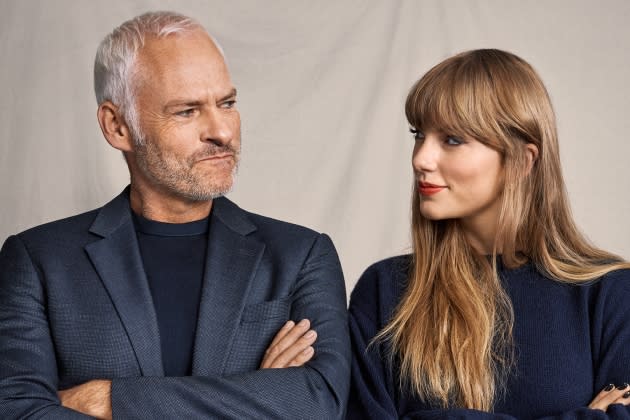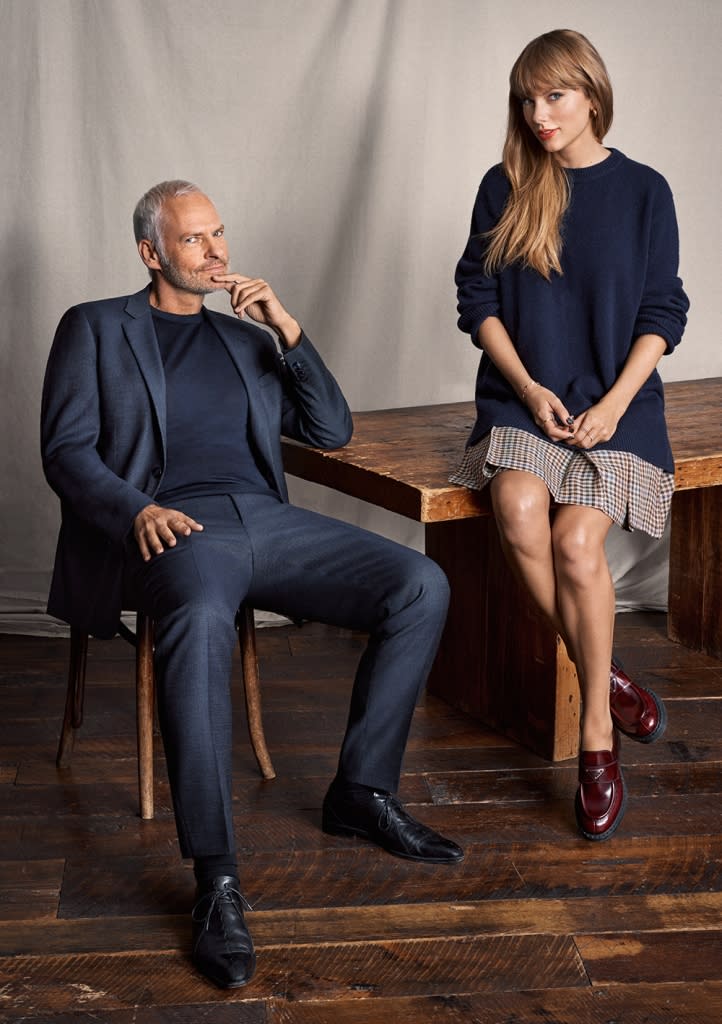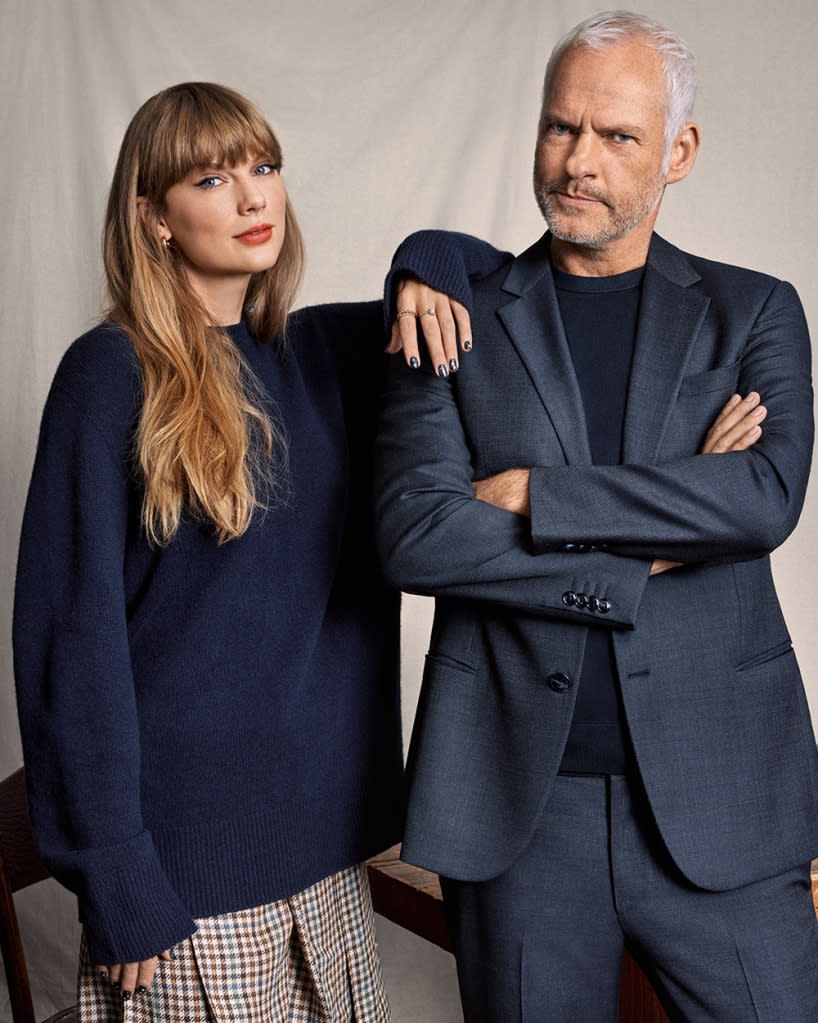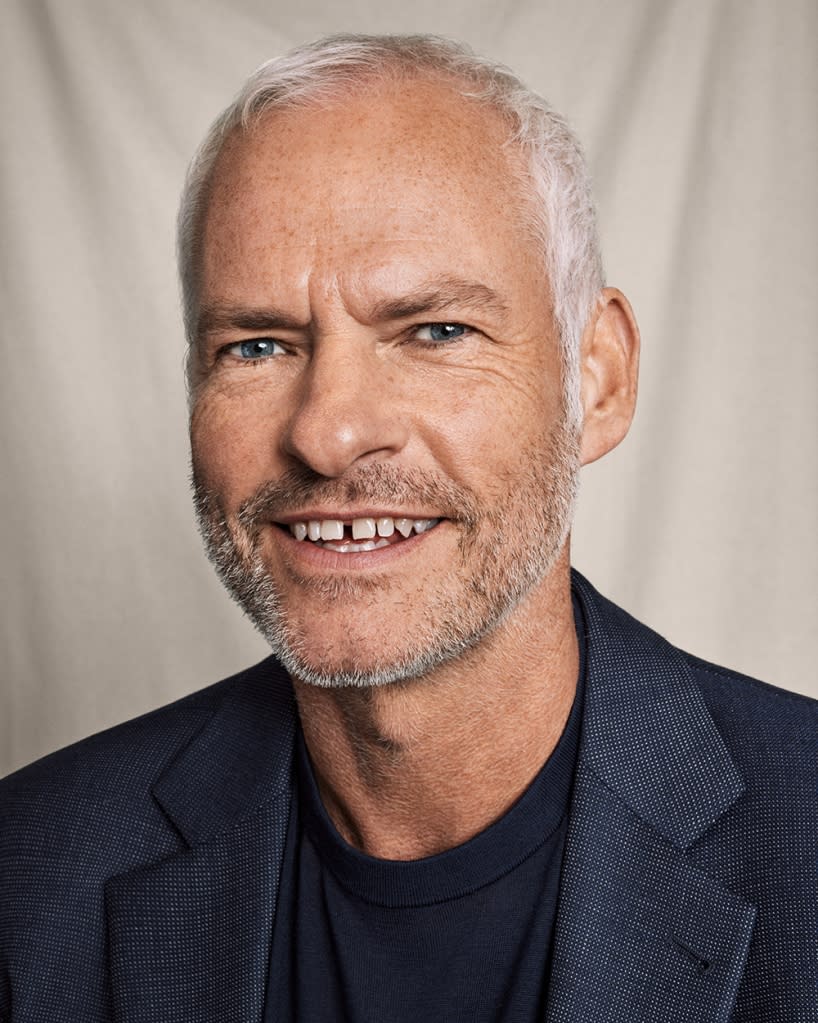Taylor Swift, Film Director, in Conversation With Martin McDonagh: How They Brought Heartbreak to Life

When playwright Martin McDonagh wanted to expand his work from stage to screen, he tested the waters by making a short film. That 2004 effort, the absurdly dark “Six Shooter,” paved the way for his career behind the camera — and won McDonagh his first Oscar. McDonagh would reteam with “Six Shooter” star Brendan Gleeson for “In Bruges” as well as for this year’s “The Banshees of Inisherin.” In McDonagh’s latest film, Colin Farrell plays a dairy farmer who has a falling out with his best friend, Colm (Gleeson), on a small island off the coast of Ireland. It’s an Oscars frontrunner — proof of just how a career can bloom out of the right short film.
Which is a model that Taylor Swift, who announced last week that she’s directing her first feature film for Searchlight Pictures, may hope to emulate. She’s already achieved too many career milestones to count, but her direction of “All Too Well: The Short Film,” a 15-minute movie that’s been viewed more than 80 million times on YouTube, represents a step in a new direction for the Grammy-winning artist who has dominated pop culture since the late 2000s. The film follows the story of one of her most beloved songs, the most-discussed track from 2021’s re-recorded album “Red (Taylor’s Version).” Fans who’d already loved “All Too Well,” devoured the saga of a 21-year-old woman (Sadie Sink) and her heartbreak over a relationship with an older man (Dylan O’Brien), and parsed all of Swift’s sorrowful and carefully chosen details.
More from Variety
It’s that detailed work that resonates with McDonagh. One of the reoccurring themes in his stories — from his plays “The Pillowman” and “Hangmen” to his movies “Seven Psychopaths” and “Three Billboards Outside Ebbing, Missouri” — is “fusing the hideous with the funny,” as a profile writer once put it. When McDonagh meets Swift in New York a few days after the release of her album “Midnights,” he quickly compliments “a mad video” she just directed for her single “Anti-Hero.” Specifically, he asks: Why does her character vomit up blue liquid?
“There was this weird theme running through the video where I bleed glitter,” Swift tells him. “It’s sort of a metaphor for how I don’t feel like a normal person. I must have something wrong with me. And it’s all the examples of disordered thinking. Thanks for watching it.”
Neither of them, perhaps, is “normal” — they both share an intense devotion to their respective artistic sensibilities. (They also share a mutual friend: Swift is pals with McDonagh’s girlfriend, Phoebe Waller-Bridge, the creator and star of “Fleabag.”) McDonagh has seen Swift in concert, and Swift is a huge fan of McDonagh’s movies, especially “In Bruges” and “Banshees.” Over the course of an hour-long conversation, they speak animatedly about working with actors, where they find inspiration and the symbolism of Colm threatening to cut off his fingers. They’re so at ease interviewing each other that the time flies by. “Ooh, that was brilliant,” McDonagh says, as they wrap. “But that was intense. We never stopped talking.” Unlike in “Banshees,” this is a friendship that doesn’t need to end.
Taylor Swift: Hi, Martin. I’m so happy to be talking with you.
Martin McDonagh: I think we should do something like Directors on Directors on mushrooms.
Swift: I was thinking margaritas or shots halfway through.
McDonagh: Let’s get back to what we’re here for.
Swift: I got a chance to go to the premiere of “The Banshees of Inisherin.” I’ve been such a fan of your work, so I wanted to talk to you about how you do it. Give us tips, put them in bullet points.
McDonagh: I’ve been a massive fan of yours for years and years. I loved “All Too Well,” so I wanted to get into the nitty-gritty of that too. Did you always want to direct?

Swift: No, I always wanted to tell stories. I have always written stories, poetry, songs. And I think this just grew out of that storytelling. And the more I did it, the more I loved it.
McDonagh: Did you ever have experiences where you knew you could do a better job than the person who was actually doing it?
Swift: Whoa, we’re just going right in, aren’t we? This actually came out of necessity. I was writing my videos for years, and I had a video that was a very specific concept I had written [2019’s “The Man”], which was that I wanted to be prosthetically turned into a man and live my life as a man. And I wanted a female director to direct it. And the few that I reached out to were fortunately booked. We like it when women work. So I was like, “I could do it, maybe.” And when I did direct, I just thought, “This is actually more fulfilling than I ever could have imagined.”
McDonagh: So it’s almost by accident?
Swift: It was, sort of. I think I’ve directed about 10 music videos and now one short. I’m just inching my way along toward taking on more responsibility. Were you starting out directing plays thinking, “I want to direct films”?
McDonagh: Weirdly, all my plays, I never directed one of them. In theater, you pick the director and you cast the actors — and no one can cut a line that you don’t want cut. So it’s a very different process to being a writer on a movie.
Swift: That’s fantastic.
McDonagh: That’s kind of why I knew I had to direct the movies — because the writer is sort of the lowest form of life on a movie. I knew I had to jump in and do the short first, just to see if I could do it without being completely terrified, and do a good job.
Swift: It’s so undistilled, and then the cow explodes. I love that you went extreme first, because I did too with the short that I did, where it’s like, “I’m just going to give you all my feelings of despair and heartbreak.”
McDonagh: In “All Too Well”? So talk me through the process of that. You wrote it knowing you were going to direct it?
Swift: Yeah. I wrote it knowing I wanted it to be a short. I wanted to treat it differently than I’d ever treated a music video. I wanted to use a new DP that I’d never used before, Rina Yang. I wanted to shoot it on 35 millimeter. And I wrote it with Sadie Sink and Dylan O’Brien in mind. I heard you wrote “Banshees” with your full cast pretty much cast.
McDonagh: Yeah. I wrote it for Colin Farrell and Brendan Gleeson and Barry Keoghan and Kerry Condon — I guess to write to their strengths, but give a little leeway to bring some strange new things to it. So you loved Dylan and Sadie’s work beforehand? Or you knew their voices? How did it work?
Swift: I’d never met either of them, but I’d seen their work. I’d seen Sadie in “Stranger Things,” and I thought she has such a presence. She has such an empathy to her. I mean, you can just see micro emotions flash across her face in a way that I don’t usually see in performances. And I thought, “She’s never been a romantic lead and I wonder if she’d be interested in playing a young woman who goes through her first catastrophic, cataclysmic heartbreak.”
McDonagh: And she did it so brilliantly. So did you write it and then meet her?
Swift: I wrote the manuscript, and I had visual references of the art direction. I put together a PDF of what I wanted to make, because I’d never made a short before, and I’m in the mode where I’m trying to persuade these two actors, and trying to convince them. They both said yes immediately when I texted them.
McDonagh: Cool. And so the script was 20 pages or 30 pages? It had dialogue and all that?
Swift: It had dialogue. I’d scripted out some scenes of them falling in love, the scene of them falling apart, breaking up. And then I’d had this argument — the argument was the one we ended up keeping as a scene without music because I thought it was just important to get a potent glimpse into their dynamic.

McDonagh: Shooting it, how did it go?
Swift: It ended up being one shot. It was one of those magic takes, where we don’t cut til 85, 90 percent through the scene.
McDonagh: Was that all your dialogue? Was it partly improvised?
Swift: It was partly improvised. I had written out that fight with the same arc. There were just some things that Dylan would blurt out or Sadie would say, and I’d just be sitting at the monitor, going, “Oh my God. We are keeping that in the cut.”
McDonagh: Is it moments like that that you felt made it a short film and took it away from the usual sort of music-video milieu?
Swift: And the fact that it has a narrative arc. The chapters in the short film, those end up being chapters in a book that she one day writes. It’s structured narratively in a way that I felt had to be different than any music video I’ve made. I wanted people to be in that world with these two characters.
McDonagh: And they are.
Swift: Watching “Banshees” — first of all, it’s such a special film. I’ve been talking about it with my friends. I talked to a friend of mine who’s a therapist, and she was saying, “If someone brought in this dream to me and said that ‘I’m wanting to cut my finger off,’” she would say, “You feel like your aliveness is being cut off by a part of your life and this art represents the fingers.” What do you think the fingers are a symbolism for?
McDonagh: I don’t know. I just thought it was funny. I never plan out a script beforehand. So I was kind of shocked when he came into the pub and made that threat. But after it happened, it throws everything in the air and anything can happen.
Swift: I love how you say you were shocked by it, as if it was an involuntary thing that just came out of your brain without you having anything to do with it.
McDonagh: It totally was. I love it when that happens. Plot twists like that, if you don’t know they’re going to happen, hopefully the audience won’t see it coming too.
Swift: I loved how “Banshees” was shot. It was gorgeous. It’s a sad film in one way, but there’s a lot of beautiful humanity in it.
McDonagh: And a beautiful donkey, Jenny. She was a little diva actually.
Swift: Yeah, I’ve heard that about asses. Directing animals, is that something that you had a lot of experience with before?
McDonagh: There was some rabbits in “Seven Psychopaths.” They survived. But I loved having them around on set. And Colin Farrell, he quotes the old adage of, “You shouldn’t work with children and animals,” but he loves it. And I love it too, because they’re just innocent. Everyone on the crew just loves being around them — especially Jenny. Little dreamboat. I watch the film now, I’m just looking at the animals. Don’t care what Colin and Brendan are doing.
Swift: I’m not going to give any spoilers, but when Colin comes home to find something devastating has happened, there’s a horse.

McDonagh: Yeah, it’s as if the horse knows the story. The horse was so good in some of the early scenes, I kept adding more and more for the horse to do.
Swift: Colin is so incredible in this. And it’s the moment where everyone in the theater was kind of audibly weeping near me.
McDonagh: I always hope that would happen. So raw and broken. For me, there was no direction to be given that morning, because I knew Colin would find the place. And my job was to get out of the way, which reminds me of Sadie’s moment in your video. Is that how you worked with Sadie on that moment?
Swift: With Sadie, it was a very similar thing, where I had a few conversations with her about how she likes to work in those kind of intense, emotive scenes. And I think she does a lot of prep work on her own. But she also had this song that she says always makes her cry, which is “Savior Complex” by Phoebe Bridgers, which your partner actually directed the video for.
McDonagh: Yep. Phoebe did. The two Phoebes.
Swift: So there’s another tie. But we ended up playing that song on set, giving Sadie room for a while. We wanted her to look like she’d been crying and the kind of body heave of that.
McDonagh: Has being an actress changed how you direct?
Swift: Every aspect of my job as a singer has affected the way that I am as a director. I’ve occasionally been in a film for very short periods of time. I really want someone to feel comfortable. If they want to be able to look at the monitor, or they want to know how it’s set up, they should be able to. But I think it’s helpful when people know what story it is they’re telling. I’ve been part of things where you didn’t know the script, and no one knew what the story was.
McDonagh: That’s crazy.
Swift: And so as much as I like to be secretive about projects I’m making, you have to trust the people that you’re making something with to let them know this is exactly why this matters.
McDonagh: Exactly. Do you feel like your songwriting is different now? Even if you’re talking about a heartbreak song, are you different in writing now as opposed to how you were when you were 22?
Swift: Yes. I definitely feel more free to create now. And I’m making more albums at a more rapid pace than I ever did before, because I think the more art you create, hopefully the less pressure you put on yourself. It’s just a phase I’m in right now. And everybody’s different. There are people who put an album out every five years and it’s brilliant and that’s the way they work. And I have full respect for that. But I’m happier when I’m making things more often.
McDonagh: Do you carve out time every day to be productive?
Swift: No, it’s kind of pushed through without asking permission.
McDonagh: Do lyrics and tunes come at the same time? Do you have to be strumming?
Swift: No. Sometimes it’s a fragment of a melody that has a lyric on it already. Sometimes it’s just a line and I’ll write it down and I’ll use it later. Sometimes it’s a melody that I have to go to the piano and then record and remember it. But the more that I’m writing, the more those ideas come. I’m just going with it.
McDonagh: “Midnights.” The new record. They call them records? Albums?
Swift: We respond to both.
McDonagh: I hear you’re going to direct videos for it? What’s next for you? Tour?
Swift: I do enjoy it a lot. I miss it.
McDonagh: I’ll come.
Swift: Please do. That would be great. You and Phoebe can come, and it’ll be a blast.
Best of Variety
'House of the Dragon': Every Character and What You Need to Know About the 'Game of Thrones' Prequel
25 Groundbreaking Female Directors: From Alice Guy to Chloé Zhao
Sign up for Variety’s Newsletter. For the latest news, follow us on Facebook, Twitter, and Instagram.

 Yahoo News
Yahoo News 
